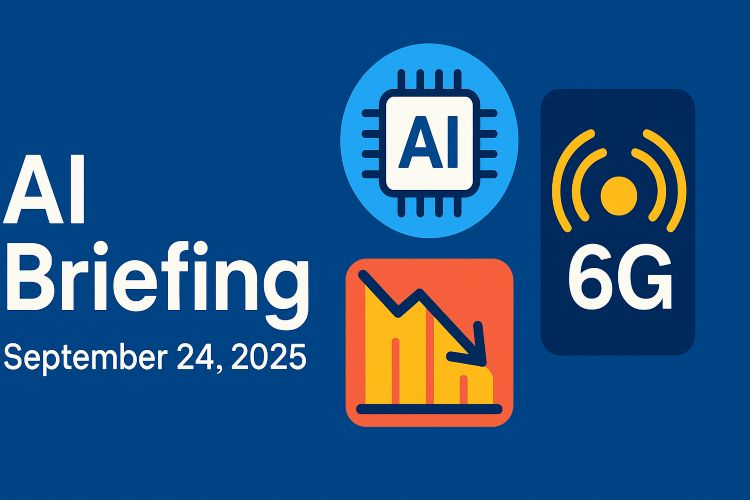AI Navigation
- articleAI Trends
- lightbulb_2AI Tips
- assistant_navigationAI Navigation
- heatHot Articles
- emergency_heat_2Hot Tips
- format_list_numberedPrompt Formatter
- psychologyTest Center(RPI)
September 24, 2025 · 24-Hour AI Briefing: Cathie Wood Returns to Chinese Tech, AI Chip Growth Slows, 6G Race Heats Up
The global AI and tech landscape continues to evolve at a rapid pace. Today’s highlights cover investment shifts, AI infrastructure trends, and the intensifying global race for 6G dominance.

1. Cathie Wood Rebuilds Alibaba Stake, Adds More Baidu
Cathie Wood, CEO of ARK Investment, has rebuilt a position in Alibaba after four years and further increased her holdings in Baidu. According to ARK’s latest filing, the fund purchased around $16.3 million worth of Alibaba ADRs. Wood believes Alibaba and Baidu’s strategic bets on AI could become new growth engines.
Commentary: Alibaba’s stock has doubled this year, driven by its cloud business, AI tools (such as the Tongyi Qianwen model), and an e-commerce rebound. Baidu, meanwhile, is gaining traction with autonomous driving (Apollo) and its search AI (Ernie Bot), up more than 60% this year. Known for her focus on “disruptive innovation,” Wood’s return to Alibaba and increase in Baidu reflect renewed confidence in the long-term growth of Chinese tech giants, particularly their AI investments. This may boost international confidence in China’s AI sector, attracting more capital. Still, retail investors should remember: investing carries risks—avoid blind chasing.
2. Omdia: AI Data Center Chip Growth Slows
A new report from Omdia shows AI data center chip growth beginning to slow. GPU and AI accelerator shipments reached $123 billion in 2024, are expected to hit $207 billion in 2025, and $286 billion by 2030. While the market grew more than 250% annually between 2022 and 2024, growth is forecast to drop to around 67% between 2024 and 2025. AI infrastructure spending as a share of overall data center budgets is expected to peak in 2026, then gradually decline toward 2030.
Commentary: Early growth came off an extremely low base, where any surge looked astronomical. But at the $100+ billion scale, maintaining sky-high growth rates becomes far harder. The past two years saw frenzied AI chip demand, often exceeding supply. Slowing growth now signals not collapse but a transition from irrational exuberance to a more rational and sustainable phase. Omdia’s findings highlight a shift from “wild west” hype to “industrial maturity”—a natural outcome of efficiency gains and intensifying competition.
3. Qualcomm: 6G Pre-Commercial Deployment by 2028
Qualcomm’s CEO announced that pre-commercial 6G equipment could be deployed as early as 2028. Samsung Electronics has also joined a global 6G commercialization alliance led by Verizon, alongside Meta, Ericsson, Nokia, and Qualcomm. The alliance aims to drive ecosystem building through prototyping and field testing.
Commentary: Qualcomm’s 2028 target brings 6G closer to reality. Standard-setting, chip R&D, network testing, and ecosystem building remain long, complex processes. The alliance of Samsung, Verizon, Meta, Ericsson, Nokia, and Qualcomm is less about technology alone and more about securing dominance over 6G standards and intellectual property. As 5G proved, those who influence early standards enjoy long-term advantages in patents and the supply chain. Yet, intense competition remains—U.S., Europe, China, Japan, and South Korea are all racing forward. This is not just a tech contest but a strategic geopolitical battle over the future of information infrastructure.
AI commercialization is evolving across capital markets, infrastructure, and frontier technologies. From Cathie Wood’s bold bets to a cooling chip market and early moves toward 6G, the next chapter of innovation is being written now.
For more cutting-edge AI updates, business insights, and tech trends, visit IAISeek
Want to catch up on major AI events from the past 72 hours? Read: